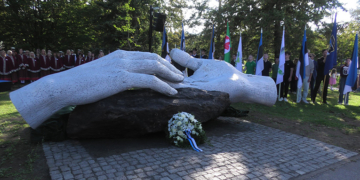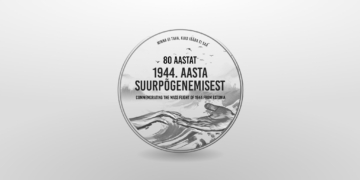Karl Altau / JBANC
Following a House Rules Committee review of a record-breaking 1213 amendments, the U.S. House of Representatives is ready to engage in floor debate on the Fiscal Year 2023 National Defense Authorization Act (NDAA). A House vote on the bill, H.R.7900, could happen by July 15.
It happens every summer.
The NDAA is critical legislation that gets passed every year and sets priority plans for funding of the U.S. defense budget. The legislation is vital, as it authorizes funding for America’s national defense and sets policies to equip, supply, and train U.S. forces now and in the future. The defense bill has been a historic first order of business and has traditionally garnered strong bipartisan and bicameral support. In addition to the NDAA, appropriations legislation helps provide funding for these critical areas.
To review, President Joe Biden earlier this year requested $773 billion dollars for the defense bill. The Senate Armed Services Committee added $45 billion to the bill when they marked it up in mid-June. The House Armed Services Committee (HASC) added $37 billion to their version of the bill and approved the bill at the end of June. The House and the Senate will have to reconcile their versions when they meet in conference committee, which may happen by later this summer. The full bill should pass by the end of the legislative session on September 30, or more commonly by the end of the calendar year and is signed by the President into law. It’s like clockwork.
How does this affect the Baltic countries?
The bill also provides direction for supporting U.S. allies and partners. Obviously, support for Ukraine is of utmost importance right now. For the Baltics, the HASC report on the bill, published on July 1, outlines recommendations for “Improvements to Baltic Security.” To paraphrase the section, HASC acknowledges the Department of Defense’s commitment to the security of the Baltic region and affirms the need to enhance the military capabilities of Estonia, Latvia, and Lithuania as three of NATO’s most vulnerable and exposed member states. For this reason, the committee will continue to support the Baltic Security Initiative as a “critical component of the U.S. Baltic security assistance strategy.” HASC, the report states, remains concerned about the need to meet “enduring threats” posed by a “resurgent and aggressive Russia,” and with that directs the Secretary of Defense to report with an updated assessment by March 1, 2023.
There are other elements in the NDAA which provide guidance for U.S. support for the Baltics, including funding for Integrated Air and Missile Defense Systems (IAMD) under the Baltic Security Initiative. The NDAA lays the path for continued strong security assistance to the Baltic countries’ capability development.
At the recent NATO Summit in Madrid, the United States and other allies further strengthened their commitment to NATO’s eastern flank. On June 29, President Biden announced the following additional long-term U.S. commitments to bolster European security with respect to the Baltic region: enhancement of rotational deployments – which include armored, aviation, air defense, and special operations forces – to reinforce Baltic security, enhance interoperability, and demonstrate the flexibility and combat readiness of U.S. forces. Furthermore, the United States has committed to maintaining a persistent, “heel-to-toe” presence in the region and will intensify training with Baltic allies to maintain combat-credible capabilities.
This support is extremely timely and is of great strategic importance for Estonia, Latvia, and Lithuania, and sends an important message of deterrence to Russia. U.S. security assistance remains critical for the Baltic countries in being able to defend against escalating threats from Russia.
This year, the bipartisan “Baltic Defense and Deterrence Act” (BDDA) was introduced to codify the Baltic Security Initiative (BSI) into law, providing $250 million per fiscal year to strengthen the Baltic state’s conventional military capabilities, especially in reconnaissance, air defense, and maritime domain awareness. This assistance comes at a critical time as Russia continues to execute its illegal, brutal, and unprovoked invasion of Ukraine and threatens America’s Eastern European allies. The bill would dissuade further Russian threats against NATO territory by demonstrating U.S. resolve for Baltic security and providing credible military deterrence against Russian military provocations along NATO’s eastern borders.
The BDDA also supports enhanced U.S.-Baltic security and economic ties. If enacted, it would provide $60 million per fiscal year to support the Baltic Security and Economic Enhancement Initiative, which aims to mitigate economic coercion by Russia and China, encourage new opportunities for foreign direct investment and U.S. business ties, and bolster Baltic energy security needs.
This legislation is important to demonstrate to the terrorist Kremlin regime that the Baltic region remains an important U.S. national security interest. It will help emphasize the strong connection between the Baltic countries and the United States, particularly this year when the countries mark their 100 years of diplomatic relations.
It bears repeating that every Estonian, Latvian, and Lithuanian knows that freedom cannot be taken for granted. Besides their ongoing commitment to invest increasing amounts above 2% of GDP for defense, the Baltic countries have been outstanding in delivering their own stocks of weapons and materials to Ukraine to help that country continue to defend itself. This is just the tip of the javelin.
If you would like to learn more or want to help ensure strong U.S. support for the Baltic countries, please contact the Joint Baltic American National Committee (JBANC): jbanc@jbanc.org .
Another way to help is to sign up to the American Latvian Association (ALA) Call to Action UNIT email list. More information here: https://alausa.org/en/our-work/civic-participation/. The CTA UNIT helps inform U.S. elected officials and policy makers about American interests in the Baltics, especially on matters of defense and security. On an ongoing basis, the CTA UNIT team identifies, develops, and issues strategic Calls to Action, such as providing information to members of Congress about legislation key for NATO support, urging Congress members to join the Baltic Caucus, recognizing officials for their NATO/Baltic leadership, and so on.






















